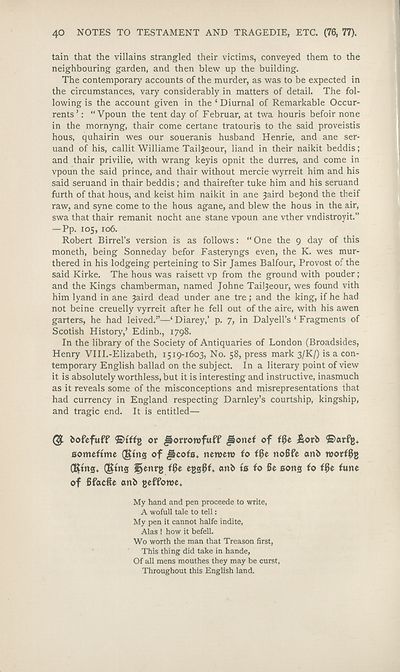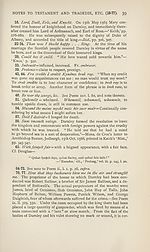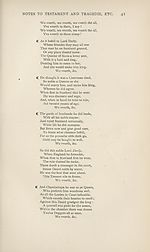Scottish Text Society publications > Old series > Satirical poems of the time of the reformation > Volume 2, 1893
(56)
Download files
Complete book:
Individual page:
Thumbnail gallery: Grid view | List view

40 NOTES TO TESTAMENT AND TRAGEDIE, ETC. (76, 77).
tain that the villains strangled their victims, conveyed them to the
neighbouring garden, and then blew up the building.
The contemporary accounts of the murder, as was to be expected in
the circumstances, vary considerably in matters of detail. The fol¬
lowing is the account given in the ‘ Diurnal of Remarkable Occur-
rents’: “ Vpoun the tent day of Februar, at twa houris befoir none
in the mornyng, thair come certane tratouris to the said proveistis
hous, quhairin wes our soueranis husband Henrie, and ane ser-
uand of his, callit Williame Tail^eour, Hand in their naikit beddis;
and thair privilie, with wrang keyis opnit the durres, and come in
vpoun the said prince, and thair without mercie wyrreit him and his
said seruand in thair beddis; and thairefter tuke him and his seruand
furth of that hous, and keist him naikit in ane ^aird bejond the theif
raw, and syne come to the hous agane, and blew the hous in the air,
swa that thair remanit nocht ane stane vpoun ane vther vndistroyit.”
— Pp. 105, 106.
Robert Birrel’s version is as follows: “ One the 9 day of this
moneth, being Sonneday befor Fasteryngs even, the K. wes mur-
thered in his lodgeing perteining to Sir James Balfour, Provost of the
said Kirke. The hous was raisett vp from the ground with pouder;
and the Kings chamberman, named Johne Tailjeour, wes found vith
him lyand in ane Jaird dead under ane tre; and the king, if he had
not beine creuelly vyrreit after he fell out of the aire, with his awen
garters, he had leived.”—‘Diarey,’ p. 7, in Dalyell’s ‘ Fragments of
Scotish History,’ Edinb., 1798.
In the library of the Society of Antiquaries of London (Broadsides,
Henry VIII.-Elizabeth, 1519-1603, No. 58, press mark 3/K/) is a con¬
temporary English ballad on the subject. In a literary point of view
it is absolutely worthless, but it is interesting and instructive, inasmuch
as it reveals some of the misconceptions and misrepresentations that
had currency in England respecting Darnley’s courtship, kingship,
and tragic end. It is entitled—
$ bofefuff ©tffg or Jlorrorofuff Jionef of f0e &orb ©arfg*
someftme QKtn0 of ^cofs, nen?ett) fo f0e noBfe anb roorffjg
OKing, QKt»S *22$*+ is fo 6e Bong fo f0e fune
of Bfacfie anb gefforoe.
My hand and pen proceede to write,
A wofull tale to tell:
My pen it cannot halfe indite,
Alas ! how it befell.
Wo worth the man that Treason first,
This thing did take in hande,
Of all mens mouthes they may be curst,
Throughout this English land.
tain that the villains strangled their victims, conveyed them to the
neighbouring garden, and then blew up the building.
The contemporary accounts of the murder, as was to be expected in
the circumstances, vary considerably in matters of detail. The fol¬
lowing is the account given in the ‘ Diurnal of Remarkable Occur-
rents’: “ Vpoun the tent day of Februar, at twa houris befoir none
in the mornyng, thair come certane tratouris to the said proveistis
hous, quhairin wes our soueranis husband Henrie, and ane ser-
uand of his, callit Williame Tail^eour, Hand in their naikit beddis;
and thair privilie, with wrang keyis opnit the durres, and come in
vpoun the said prince, and thair without mercie wyrreit him and his
said seruand in thair beddis; and thairefter tuke him and his seruand
furth of that hous, and keist him naikit in ane ^aird bejond the theif
raw, and syne come to the hous agane, and blew the hous in the air,
swa that thair remanit nocht ane stane vpoun ane vther vndistroyit.”
— Pp. 105, 106.
Robert Birrel’s version is as follows: “ One the 9 day of this
moneth, being Sonneday befor Fasteryngs even, the K. wes mur-
thered in his lodgeing perteining to Sir James Balfour, Provost of the
said Kirke. The hous was raisett vp from the ground with pouder;
and the Kings chamberman, named Johne Tailjeour, wes found vith
him lyand in ane Jaird dead under ane tre; and the king, if he had
not beine creuelly vyrreit after he fell out of the aire, with his awen
garters, he had leived.”—‘Diarey,’ p. 7, in Dalyell’s ‘ Fragments of
Scotish History,’ Edinb., 1798.
In the library of the Society of Antiquaries of London (Broadsides,
Henry VIII.-Elizabeth, 1519-1603, No. 58, press mark 3/K/) is a con¬
temporary English ballad on the subject. In a literary point of view
it is absolutely worthless, but it is interesting and instructive, inasmuch
as it reveals some of the misconceptions and misrepresentations that
had currency in England respecting Darnley’s courtship, kingship,
and tragic end. It is entitled—
$ bofefuff ©tffg or Jlorrorofuff Jionef of f0e &orb ©arfg*
someftme QKtn0 of ^cofs, nen?ett) fo f0e noBfe anb roorffjg
OKing, QKt»S *22$*+ is fo 6e Bong fo f0e fune
of Bfacfie anb gefforoe.
My hand and pen proceede to write,
A wofull tale to tell:
My pen it cannot halfe indite,
Alas ! how it befell.
Wo worth the man that Treason first,
This thing did take in hande,
Of all mens mouthes they may be curst,
Throughout this English land.
Set display mode to: Large image | Zoom image | Transcription
Images and transcriptions on this page, including medium image downloads, may be used under the Creative Commons Attribution 4.0 International Licence unless otherwise stated. ![]()
| Publications by Scottish clubs > Scottish Text Society publications > Old series > Satirical poems of the time of the reformation > Volume 2, 1893 > (56) |
|---|
| Permanent URL | https://digital.nls.uk/107427431 |
|---|
| Attribution and copyright: |
|
|---|
| Description | A collection of over 100 Scottish texts dating from around 1400 to 1700. Most titles are in Scots, and include editions of poetry, drama, and prose by major Scottish writers such as John Barbour, William Dunbar, Gavin Douglas, and George Buchanan. Edited by a key scholarly publisher of Scotland's literary history, and published from the late 19th century onwards by the Scottish Text Society. Available here are STS series 1-3. |
|---|

